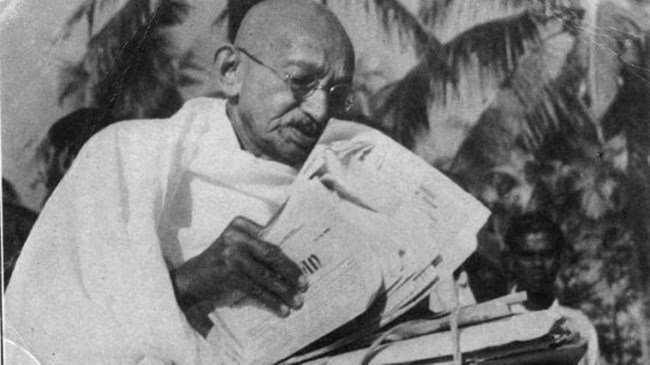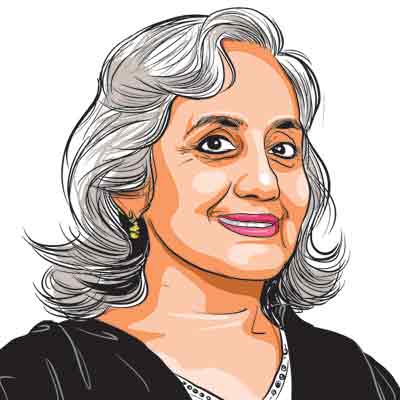Opinion RSS and Gandhi share a birthday. In that irony, there is a call to move beyond violence — and seeing the ‘other’ in a new light
Demonising the opponent is futile or even counter-productive. This undermines the possibility of tapping the forces of light within the wrong-doer, or at the very least, trying to see where the wrong-doer is coming from. A politics that draws its energy from resentment inevitably feeds hatred and animosity
 This October 2, there may be many who will celebrate one birthday while treating the other as worthy of condemnation. But such a simplistic divide is both unfortunate and misleading (Express Archive)
This October 2, there may be many who will celebrate one birthday while treating the other as worthy of condemnation. But such a simplistic divide is both unfortunate and misleading (Express Archive) In an ironic twist, the Rashtriya Swayamsevak Sangh (RSS) will complete 100 years on Gandhi Jayanti. Even if the term “cosmic coincidence” appears misplaced here, this juxtaposition of birthdays calls for open-minded reflection, some “hatke” perspectives.
When the RSS was born, on Dussehra day in 1925, M K Gandhi was a major national leader. Over the next 28 years, while the RSS created a grassroots cadre to build the strength of Hindus, Gandhi applied his spiritual anchor as a Sanatani Hindu to address bitter socio-political conflicts through love and non-violence.
On January 30, 1948, Gandhi was murdered — for allegedly being anti-Hindu. The world mourned the passing of an inspirational colossus. By then, the RSS had grown roots; it was briefly banned for being one of the influences that led to Gandhi’s assassination. Almost eight decades later, on the face of it, the RSS is triumphant while Gandhi’s legacy is commonly seen as faded, tattered.
And yet, it is not quite “game over”. The concerns underlying Gandhi’s opposition to “Hindu” nationalism have become more urgent. Namely: What does it mean to be truly sabhya or civilised? In that context, what does it mean to be a Hindu or a Muslim, Christian or Sikh or Jew? Above all, how do each one of us relate to, or deal with, whoever we perceive to be the “other”? It would be presumptuous to assume that we can know what Gandhi would have done today. But the inspiration of the civilisational Gandhi does provide some cautionary road signs.
Lamentation in and of itself is unhelpful. The promotion of hatred needs to be creatively and constructively overcome. Hating the hater does not do that. Assigning responsibility for wrong-doing is vital. But this is different from either blame and shame or moral ambiguity. We need to stand firmly against the wrongdoing while fostering spaces for redemption of the wrong-doer.
Demonising the opponent is futile or even counter-productive. This undermines the possibility of tapping the forces of light within the wrong-doer — or at the very least trying to see where the wrong-doer is coming from. A politics that draws its energy from resentment inevitably feeds hatred and animosity.
These truths apply to every shade of ideology and political action. The physics of human behaviour does not operate differently whether you feel aligned to Gandhi or to his assassin. The RSS centenary year comes at a time when there is a pervasive feeling that reason and generosity in public discourse are a thing of the past. It is easy and lazy to put the blame for this situation entirely on the political and cultural movement that the RSS has nurtured, one that has been on a winning streak since the 1990s.
Most movements that have given primacy to their end goal rather than means, have tended to either actively use violence and hatred or make excuses for them. In this respect, the RSS is only part of a long, global historical trend.
What is new is the mass scale alienation and polarisation generated by digital platforms. This has spawned extremes of hate speech and hate crimes which now have a life of their own. It is unclear whether the formal structures of the RSS are unable or unwilling to check these forces. What is clear is that these energies are not a genie that could be put back in its bottle. These are political and psychological phenomena that can only be transformed and diffused through a mass renewal of samaj and its moral energy.
One obstacle to this is the acute polarisation over how the RSS is seen. For a large number of Indians, this organisation represents restoration of not just Hindu pride but Indian confidence. For an equally large number, it represents a politics of Hindu supremacy, with ill-treatment of Muslims and Christians becoming commonplace.
Both perceptions are factually correct and yet, the two opposing sides have something in common: The belief that conflict itself is unsolvable and thus permanent. For example, if you see Hindus as a beleaguered global minority under perpetual threat from Muslims and Christians, then it may be impossible to ever imagine a cessation of hostilities. If you treat all religion as regressive, then it is equally difficult to imagine a secular democratic society without a defeat of the religious amongst us.
Conflict is an inherent part of the human condition. But violence — that is, physical harm and indignity — is neither inevitable nor unavoidable.
There is a long history of tenacious conflicts between groups — over centuries. But there is also evidence of how human beings have peacefully resolved conflicts. This evidence shows some repeat patterns which are worth highlighting. One, disagreement may persist but dislike and mistrust can fade into insignificance. Two, because you no longer fear the “other”, neither the fear nor the “other” look like monsters. Three, this creates mental space to identify and understand the concern behind the complaint/anger of the opponent.
I am painfully aware that all of this seems unhelpful to the person who is being attacked by a mob. Yet, listening closely to human rights workers on the ground sometimes reveals a glimmer of light. There are accounts of physically weak individuals spontaneously jumping into the fray to defend a person who is being beaten because of their caste or religion. There are reports of how people who seem to approve of violence when part of a crowd, behave differently when they are alone and engaged in conversation with a sympathetic listener.
This October 2, there may be many who will celebrate one birthday while treating the other as worthy of condemnation. But such a simplistic divide is both unfortunate and misleading. The future depends upon all those who are willing to at least know, if not embrace, the “otherness” of their other. By the way — “cosmic coincidence” is a legitimate term in cosmology, referring to chance events and unlikely phenomena. For instance, the Sun is about 400 times larger than the moon and 400 times farther away. It is this ratio which allows for a solar eclipse — making the moon appear to perfectly cover the Sun.
Bakshi is an author and the founder of the Youtube channel ‘Ahimsa Conversations’






